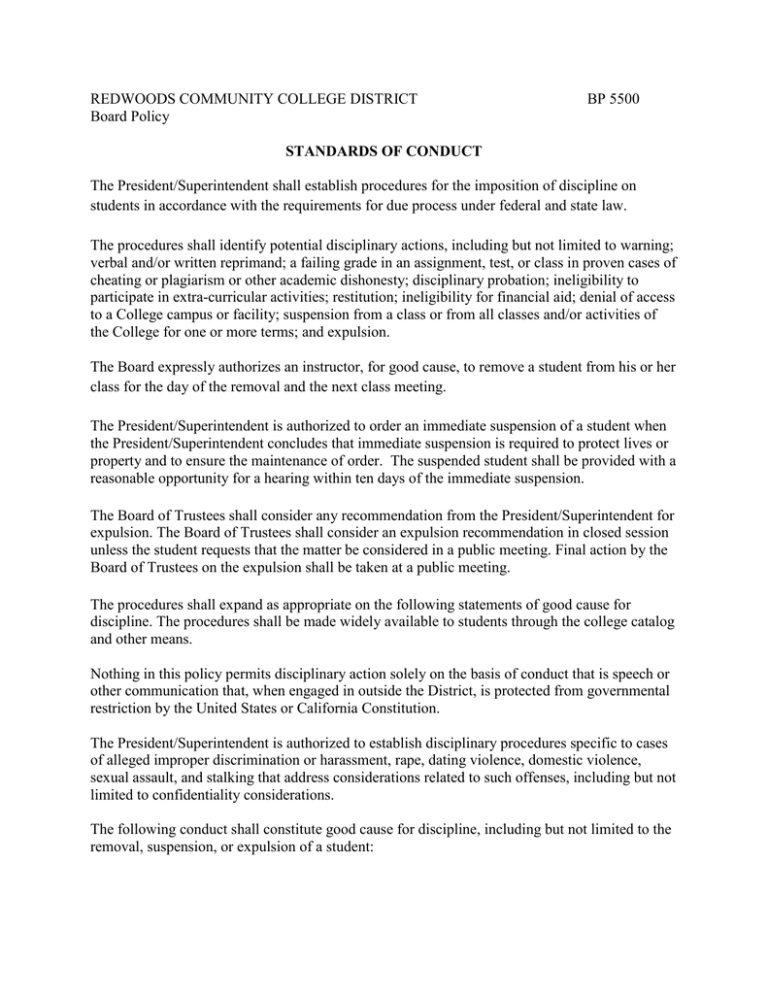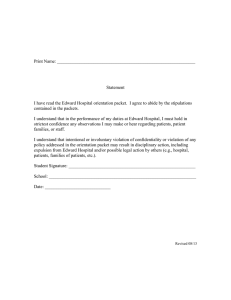
REDWOODS COMMUNITY COLLEGE DISTRICT
Board Policy
BP 5500
STANDARDS OF CONDUCT
The President/Superintendent shall establish procedures for the imposition of discipline on
students in accordance with the requirements for due process under federal and state law.
The procedures shall identify potential disciplinary actions, including but not limited to warning;
verbal and/or written reprimand; a failing grade in an assignment, test, or class in proven cases of
cheating or plagiarism or other academic dishonesty; disciplinary probation; ineligibility to
participate in extra-curricular activities; restitution; ineligibility for financial aid; denial of access
to a College campus or facility; suspension from a class or from all classes and/or activities of
the College for one or more terms; and expulsion.
The Board expressly authorizes an instructor, for good cause, to remove a student from his or her
class for the day of the removal and the next class meeting.
The President/Superintendent is authorized to order an immediate suspension of a student when
the President/Superintendent concludes that immediate suspension is required to protect lives or
property and to ensure the maintenance of order. The suspended student shall be provided with a
reasonable opportunity for a hearing within ten days of the immediate suspension.
The Board of Trustees shall consider any recommendation from the President/Superintendent for
expulsion. The Board of Trustees shall consider an expulsion recommendation in closed session
unless the student requests that the matter be considered in a public meeting. Final action by the
Board of Trustees on the expulsion shall be taken at a public meeting.
The procedures shall expand as appropriate on the following statements of good cause for
discipline. The procedures shall be made widely available to students through the college catalog
and other means.
Nothing in this policy permits disciplinary action solely on the basis of conduct that is speech or
other communication that, when engaged in outside the District, is protected from governmental
restriction by the United States or California Constitution.
The President/Superintendent is authorized to establish disciplinary procedures specific to cases
of alleged improper discrimination or harassment, rape, dating violence, domestic violence,
sexual assault, and stalking that address considerations related to such offenses, including but not
limited to confidentiality considerations.
The following conduct shall constitute good cause for discipline, including but not limited to the
removal, suspension, or expulsion of a student:
1. Academic dishonesty which includes cheating, plagiarism, and hampering or discrediting the
academic work of others, and as shall be more fully defined in administrative procedures.
Violation of copyright laws using District resources, including unauthorized peer-to-peer file
sharing, or unauthorized downloading or distribution of copyrighted materials using the
District’s information technology system.
2. Continued disruptive behavior or obstructing the work and operation of the College, as shall
be more fully defined in administrative procedures.
3. Defamation: An individual shall not use defamatory words or phrases or distribute defamatory
materials. Defamatory words or materials are those that: (1) are false and/or expose any person
or the college to hatred, contempt, ridicule, disgust or an equivalent reaction; or (2) are false and
have a tendency to impugn a person’s occupation, business, or office.
4. Violation of the College’s computer use policy or any conduct that constitutes a computerrelated crime pursuant to Penal Code, section 502. Using electronic technology which includes,
but is not limited to: internet, e-mail, telephone, fax machines, or instant messaging to intimidate
another member of the College community.
5. Theft (actual or attempted) or destruction of College property or property belonging to a
member of the College community or other abuse of College computer facilities, programs,
technology and equipment as shall be more fully described in administrative procedures.
6. Coercion, which is defined as attempting to compel, control, or manipulate another
through the threat of force, intimidation, exploitation of fear or anxiety, including explicit and
implied physical and verbal threats against another person.
7. Disruption or obstruction of teaching, research, administration, disciplinary proceedings, other
College activities, including its public service functions on or off campus, or of other authorized
non-College activities when the conduct occurs on College premises. Intentionally obstructing or
denying access to facilities or services to individuals entitled to use such services or facilities.
Intentionally interfering with the lawful rights of other persons on campus.
8. Violation of the District’s nondiscrimination or sexual harassment policies, or engaging in
harassing, or retaliatory behavior in violation of District policy or sexual assault or physical
abuse, including but not limited to rape, domestic violence, dating violence, sexual assault or
stalking as defined in College procedures.
9. Violation of local, county, state, or federal law, whether it be on or off campus, only when a
definite College interest is involved and where the student misconduct distinctly and adversely
affects the College’s pursuit of its educational mission
10. Wearing, transporting, storing, or possessing firearms or other weapons on College property
(including College-owned vehicles and parking lots), at College-sponsored or College-related
functions or events, and during times when acting as a representative of the College whether on
or off College premises The administrative procedures shall define “weapons” prohibited by
this policy to include firearms, knives, explosives, clubs and other items used as a threat to do
bodily harm and facsimiles of such weapons.
11. Intentional obstruction of the freedom of movement of pedestrian or vehicular traffic on
College premises.
12. Participation in a campus demonstration which disrupts the normal operations of the
College and infringes on the rights of other members of the College community.
13. Leading or inciting others to materially disrupt scheduled and/or normal activities within any
campus building or area.
14. Detention or physical abuse, or assault or battery, extortion, or intimidation of any person or
conduct which is intended to threaten imminent bodily harm or endanger the health or safety of
any person on any property owned or controlled by the College or at any College sponsored or
supervised functions.
15. Failure to comply with reasonable directions of College officials or public safety officers
acting in performance of their duties on campus or affecting conduct on campus.
16. Unauthorized possession, duplication or use of keys to any College premises or , supplies or
equipment, including computing, networking, or information resources unauthorized entry to or
use of CR premises.
17. Being an accessory to any person on the College campus who is or who is not a member of
the College community in committing a violation of this code.
18. Violation of College Board policies, published College policies, rules, procedures, or
regulations.
19. Conduct that is disorderly, lewd, or indecent; breach of peace; or aiding, abetting, or
procuring another person to breach the peace on College premises or at functions sponsored by,
or participated in by, College or members of the College community.
20. Obstruction or disruption of the Student Code of Conduct disciplinary procedures, which
shall be defined more fully in administrative procedures.
21. Unlawful possession, use, sale, offer to sell, or furnishing, or being under the influence of,
any controlled substance listed in California Health and Safety Code Section 11053 et seq., an
alcoholic beverage, or an intoxicant of any kind; or unlawful possession of, or offering,
arranging or negotiating the sale of any drug paraphernalia, as defined in California Health and
Safety Code Section 11014.5 or use, sale or distribution of any poison defined in Section 4240 of
the Business and Professions Code.
22. Willful or persistent smoking in any area where smoking has been prohibited by law or by
regulation of the College.
23. Willful misconduct that results in injury or death to a student or to College personnel or
which results in cutting, defacing, or other injury to any real or personal property owned by the
College or on campus.
24. Dishonesty, including but not limited to forgery; alteration or misuse of College documents,
records, or identification; or knowingly furnishing false information to the College.
25. Engaging in expression which is obscene, libelous or slanderous, or which so incites students
as to create a clear and present danger of the commission of unlawful acts on College premises,
or the violation of lawful College regulations, or the substantial disruption of the orderly
operation of the College.
26. Persistent, serious misconduct where other means of correction have failed to bring about
proper conduct.
27. Unauthorized preparation, giving, selling, transfer, distribution, or publication, for any
commercial purpose, of any contemporaneous recording of an academic presentation in a
classroom or equivalent site of instruction, including but not limited to handwritten or
typewritten class notes, except as permitted by any district policy or administrative procedure.
28. The use by a student of any electronic listening or recording device in any classroom without
the prior consent of the instructor, except as necessary to provide reasonable auxiliary aids and
academic adjustments to a student with a disability.
29. Disengaging smoke or fire detection equipment.
30. Initiation of or participation in hate violence.
31. Solicitation or acceptance of money or other thing of value as an inducement,
encouragement, or reward for intercollegiate participation in violation of Education Code,
section 67361 or false declarations regarding eligibility for participation in intercollegiate
athletics under Education Code, section 67362); and
32. The offering of any inducement or thing of value to influence the award of any grade or to
alter any official College record.
The President/Superintendent shall establish procedures for the imposition of discipline on
students in accordance with the requirements for due process of the federal and state law and
regulations. The procedures shall clearly define the conduct that is subject to discipline, and shall
identify potential disciplinary actions, including but not limited to the removal, suspension, or
expulsion of a student.
The Board of Trustees shall consider any recommendation from the President/Superintendent for
expulsion. The Board of Trustees shall consider an expulsion recommendation in closed session
unless the student requests that the matter be considered in a public meeting. Final action by the
Board of Trustees on the expulsion shall be taken at a public meeting. The procedures shall be
made widely available to students through the college catalog and other means.
The following conduct shall constitute good cause for discipline, including but not limited to the
removal, suspension, or expulsion of a student in areas including, but not limited to:
1.Disruptive behavior.
2.Assault, sexual assault, or threat of violence.
3.Alcohol and drugs.
4.Acts of dishonesty.
5.Unauthorized possession or use of district property.
6.Firearms,weapons, or dangerous chemicals.
See Administrative Procedure #AP 5500
References: Education Code Section 66300; Accreditation Standard II.A.7.b
34 CFR 668.43(a)(10).
Penal Code 502
Adopted by Board of Trustees: 11/6/07
Former Policy #505, “Student Discipline Policy,” Ad
opted by the Board of Trustees: 8/15/7



